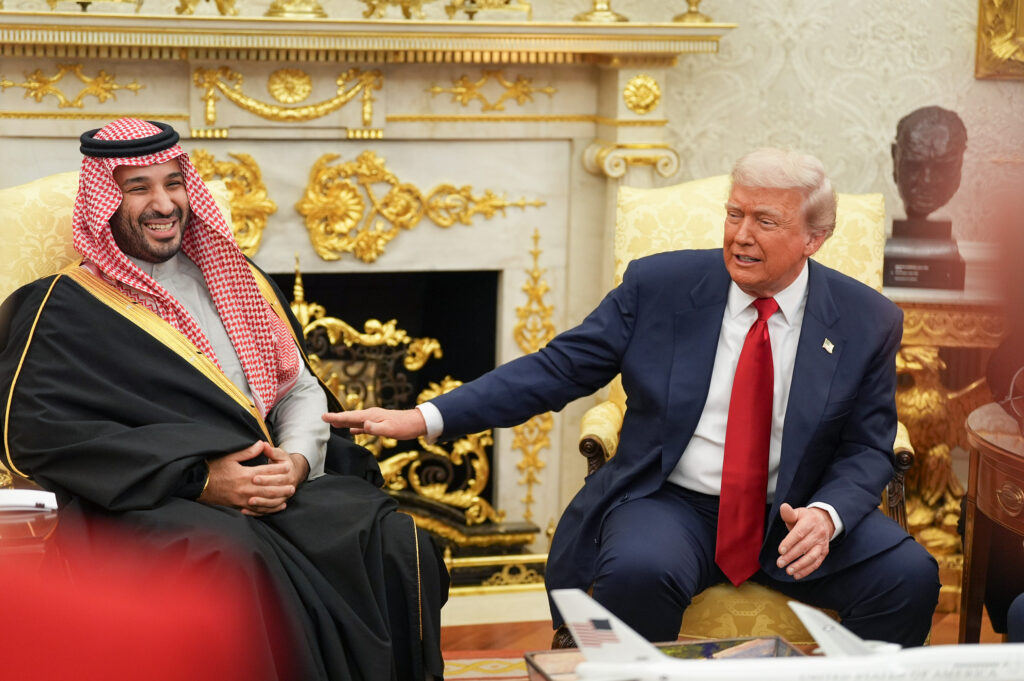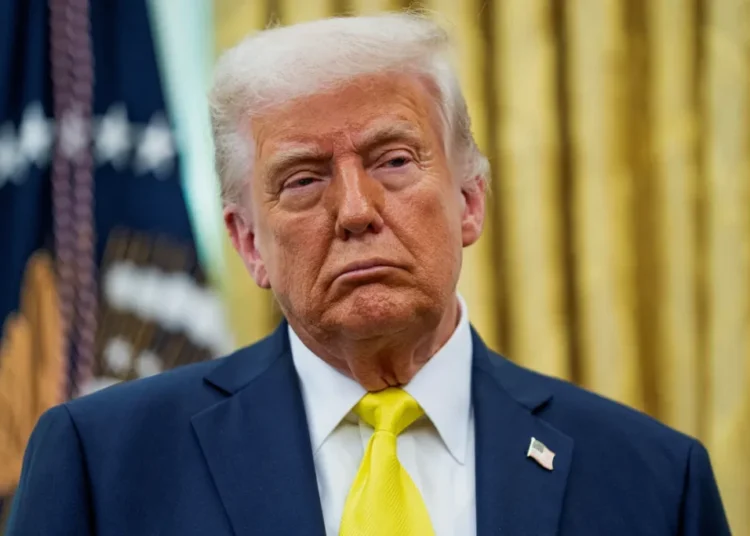Even in the absence of normalization between Israel and Saudi Arabia, a new normal is taking hold of the Middle East. On Tuesday, President Donald Trump hosted Saudi Crown Prince Mohammed bin Salman at the White House in a visit that illustrated the geopolitical priorities of both countries and reinforced the extent to which the United States and other major powers have forgiven the influential royal’s role in the 2018 abduction and murder of Washington Post columnist Jamal Khashoggi.
In a combative session with reporters, Trump, sitting alongside Mohammed, praised Saudi Arabia’s human rights record and dismissed Khashoggi’s killing. “Things happen,” he shrugged, insisting that he didn’t hold the prince responsible despite a U.S. intelligence report assessing the opposite. Mohammed was received with great pomp and ceremony, including a military flyover and what amounted to a de facto state dinner for a youthful scion attended by a coterie of top tech and business leaders.
The summit marked a continuation of former president Joe Biden’s embrace of the Saudis, whom successive U.S. administrations have come to view as essential to U.S. interests in the region and potential allies in the far greater 21st century contest with China. But Trump, whose family businesses have established myriad lucrative links to the kingdom, stressed that his alliance with the crown prince amounted to far more than the conspicuous fist bump Biden gave him on a trip to the region in 2022.
“I grab that hand,” Trump said exuberantly, sitting next to a grinning Mohammed. “I don’t give a hell where that hand’s been!”
Others do. “[We] at The Washington Post will continue to remind you that one of our colleagues in the not-so-distant past was murdered,” Jason Rezaian, The Post’s director of press freedom initiatives, told NPR on Tuesday. “That’s not something we can just wipe under the rug or forget about.”
On Tuesday, the White House focused on major new deals between Saudi Arabia and the United States, including the potential Saudi purchase of cutting-edge F-35 fighter jets. Other discussions covered the possibility of a diplomatic opening with Iran, energy, and the global critical minerals supply chain.
But arguably the biggest political issue looming over the room was the state of play in Gaza, the Palestinian territory that’s been flattened by the Israeli military in the wake of Hamas’s deadly attack on southern Israel on Oct. 7, 2023. Two years of ruinous war have chilled any hope that Saudi Arabia would soon join the Abraham Accords — the normalization deals between Israel and a clutch of Arab monarchies that Trump helped broker in his first term. Mohammed, who is known to not have a strong emotional attachment to the Palestinian cause, is, on this front, still beholden to the instincts of the court in Riyadh, as well as broader pro-Palestinian public sentiment in his country.
On Tuesday, Mohammed welcomed the prospect of peace between Israelis and Palestinians, but indicated that any normalization with Israel would require a clear path to the emergence of a separate Palestinian state. A day prior, the U.N. Security Council passed a U.S.-backed resolution that, according to my colleague Karen DeYoung, enshrines Trump’s plan for Gaza in international law, “establishing a vaguely defined Board of Peace, headed by Trump with membership chosen by him, that for two years will control virtually every aspect from security and governance to reconstruction of Gaza.”
The plan — which has forgone critical input from Palestinians — nods at a potential pathway toward Palestinian sovereignty, but is surrounded by conditions and caveats that effectively kick the can of statehood down the road. Israeli politicians, including Prime Minister Benjamin Netanyahu, remain adamantly opposed to any discussion of Palestinian statehood, which they argue would be a reward for Hamas’s terrorism. Some in Netanyahu’s cabinet are also explicit about the future they see for Palestinians: One where they accept living as second-class citizens under Jewish supremacy, or leave.
“The only real solution for Gaza,” Defense Minister Israel Katz recently said, “is encouraging voluntary emigration.”
Neither the political process endorsed at the United Nations nor deepening U.S.-Saudi ties change the bleak reality for Palestinians on the ground. As The Post reported, far-right Israeli settlers, emboldened by the dispensation in power, unleashed a wave of terror in the West Bank, endangering Palestinian farmers during their annual olive harvest.
“Across 77 towns and villages, according to U.N. figures, gangs of Jewish extremists have burned cars, looted farming equipment and vandalized more than 4,000 trees and saplings,” my colleague Louisa Loveluck wrote last week. “The number of attacks by Israeli settlers on Palestinians — an average of eight incidents a day — is the highest since the United Nations began documenting them in 2006.”
Israeli authorities have condemned the violence, but rights groups and activists allege that, in some instances, Israeli troops enabled or stood by during the vigilante attacks. The coercion and pressure undercut the assertions of Trump and other Arab leaders that Israel won’t be able to carry out a de facto annexation of the West Bank.
“The West Bank is completely controlled by Israel,” Yuli Novak, executive director of B’Tselem, a leading Israeli human rights group, told me during a visit to Washington. She and her colleagues have pointed to a systematic process of settlers and the Israeli state confiscating Palestinian land, hoarding access to water supply and squeezing Palestinian life in the territory. “What we see in the past two years is that each and every Palestinian in the West Bank is exposed to violence that has basically no limit.”
In devastated Gaza, the situation is worse. Hundreds of Palestinians have been killed by Israeli bombardments — even after a ceasefire was brokered between the warring parties. Humanitarian aid is still restricted. Civilian infrastructure has been mostly destroyed. B’Tselem declared this year that Israel is “taking coordinated, deliberate action to destroy Palestinian society in Gaza” — that is, carrying out crimes of genocide in Gaza.
Novak feared the return of a status quo where Israel can carry on its campaigns with “much less criticism, because there is the facade of things being okay.” In the meeting of Trump and Mohammed, you can see the edifice behind that facade taking shape.
Sign up to receive WorldView, a free, thrice-weekly email newsletter from the international desk of The Washington Post.
The post As Trump hosts MBS, Palestinian plight fades from view again
appeared first on Washington Post.




